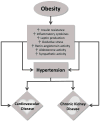Hypertension in Obesity and the Impact of Weight Loss
- PMID: 28840500
- PMCID: PMC5606235
- DOI: 10.1007/s11886-017-0912-4
Hypertension in Obesity and the Impact of Weight Loss
Abstract
Purpose of review: Several interrelated mechanisms promote the development of hypertension in obesity, often contributing to end organ damage including cardiovascular disease and chronic kidney disease.
Recent findings: The treatment of hypertension in obesity is complicated by a high prevalence of resistant hypertension, as well as unpredictable hemodynamic effects of many medications. Weight loss stabilizes neurohormonal activity and causes clinically significant reductions in blood pressure. While lifestyle interventions can improve blood pressure, they fail to consistently yield sustained weight loss and have not demonstrated long-term benefits. Bariatric surgery provides more permanent weight reduction, corresponding with dramatic declines in blood pressure and attenuation of long-term cardiovascular risk. Hypertension is closely linked to the prevalence, pathophysiology, and morbidity of obesity. There are multiple barriers to managing hypertension in obesity. Surgical weight loss offers the most promise in reducing blood pressure and decreasing end organ damage in this patient population.
Keywords: Antihypertensive; Bariatric surgery; Hypertension; Morbid obesity; Obesity; Weight loss.
Conflict of interest statement
Jordana B. Cohen declares that she has no conflict of interest.
This article contains information on a retrospective study performed by the author. For this type of study formal consent is not required. The article does not contain any other studies with human or animal subjects performed by the author.
References
-
- The GBD 2015 Obesity Collaborators. Health Effects of Overweight and Obesity in 195 Countries over 25 Years. N Engl J Med. 2017 doi: 10.1056/NEJMoa1614362. This systematic review of epidemiologic evidence evaluated trends in obesity across 195 countries, evaluating the global impact of obesity on mortality and disability. Unlike previous studies, these analyses addressed important issues including the relationship between BMI and economic development and the influence of of epidemiologic and demographic transition on disease burden in obesity. - DOI - PMC - PubMed
-
- Ng M, Fleming T, Robinson M, Thomson B, Graetz N, Margono C, et al. Global, regional, and national prevalence of overweight and obesity in children and adults during 1980–2013: a systematic analysis for the Global Burden of Disease Study 2013. Lancet. 2014;384(9945):766–81. doi: 10.1016/S0140-6736(14)60460-8. - DOI - PMC - PubMed
-
- Wormser D, Kaptoge S, Di Angelantonio E, Wood AM, Pennells L, Thompson A, et al. Separate and combined associations of body-mass index and abdominal adiposity with cardiovascular disease: collaborative analysis of 58 prospective studies. Lancet. 2011;377(9771):1085–95. doi: 10.1016/S0140-6736(11)60105-0. - DOI - PMC - PubMed
Publication types
MeSH terms
Grants and funding
LinkOut - more resources
Full Text Sources
Other Literature Sources
Medical
Research Materials


